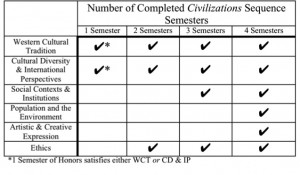Curriculum Overview
The Honors College is excited to announce that we have a new curriculum for incoming first-year students starting in the fall of 2025.
Honors Curriculum for students who started in Honors before fall 2025
The Honors Curriculum is a 24-27 credit program.
To graduate with Honors students must have a 3.30 GPA at the time of graduation and complete:
For more information on Honors GPA requirements, click here.
General Education Requirements

The Honors College Curriculum: Empowering Students to Develop their Whole Selves
**for first-year students who start Honors in fall 2025 and after**
A hub for inter- and cross-disciplinary inquiry and creative teaching and learning, the UMaine Honors College helps students become curious and creative problem-solvers, intellectual risk-takers, and compassionate, engaged individuals. Our four-year developmental “curriculum for inquiry” fosters academic skills and habits of mind that are valuable across all majors and degree programs and prepares students to take the next steps in their personal, intellectual, and professional journeys. The curriculum consists of 19-22 credits and satisfies a large portion of UMaine’s General Education requirements, as described in detail below.
Honors credentials are indicated on final transcripts as well as the University of Maine diploma. Honors graduates are recognized at the University of Maine commencement ceremony and are distinguished by the Honors medallion they receive upon completion of requirements.
Note: the curriculum described below applies to first-year students who matriculate at the University of Maine beginning in the Fall of 2025.
The Honors Curriculum is divided into two parts:
I: Cultivating Inquiry and Creative Practice (Semesters 1-4; 12 total credit hours)
From their first Honors class, students will begin building foundational skills in inquiry in small seminars led by world-class faculty members on the cutting edge of knowledge creation, scholarship, and practice. In this 4-course sequence, students will develop and practice increasingly advanced academic and research skills on diverse topics such as rebellious women, the history of plagues, urban landscapes, and biomedical ethics. Learning outcomes will be consistent across all sections, while course themes will vary according to faculty interest and expertise. Classes are typically between 12-15 students.
II: Translating Learning into Real-World Impact (Semesters 5-8; 7-10 total credit hours)
In their fifth semester, Honors students will consider how their skills can be applied beyond the classroom, practicing writing for the public in a Calderwood Seminar, studying abroad, or participating in an internship, for example. Then, students will apply their skills to a problem or project of their choosing. Students will work with a faculty advisor or in teams to create something meaningful in the world, from conducting research or developing a plan for a new non-profit organization to choreographing a dance, writing a book of poems, or designing tools that help us advance our knowledge of climate change. Students will execute their project and then integrate their experiences into an Honors portfolio. Begun in the first semester in Honors, the finished portfolio demonstrates the skills they have gained and the academic, personal, and professional growth they have achieved while at UMaine.
When they complete the curriculum, Honors students will possess a well-curated toolbox of academic and interpersonal skills, along with a polished portfolio that they can utilize in their life after UMaine – whether applying to graduate or professional school, engaging in volunteer work, or entering the workforce.
The Honors Curriculum: A Semester-by-Semester guide
The following is based on a student earning their undergraduate degree in 8 semesters and is a general guide only. Except where specified, all Honors courses are 3 credit hours. Note: the program of study may be different for students who complete internships off-campus, take summer coursework, are in credit-intensive majors, etc. Honors advisement throughout each student’s academic career will ensure that they are progressing in the curriculum.
The Honors College welcomes transfer students (both internal and external) and will work with transfer students individually to craft an appropriate path of study.
Year 1
HON 101: Explore: Foundations of Inquiry (Fall)
Honors Portfolio: students will create and contribute to their portfolio, per HC guidelines.
HON 102: Connect: Evidence & Argument (Spring)
Honors Portfolio: students will contribute to their portfolio, per HC guidelines.
Year 2
HON 201: Design: Projects for Impact (Fall)
Honors Portfolio: Students will contribute to their portfolio, per HC guidelines.
HON 202: Engage: Practice & Scholarship (Spring)
Honors Portfolio: students will contribute to their portfolio, per HC guidelines.
Year 3
HON 301: Public Experience Seminar (Fall/Spring) or HON 349: Public Experience Seminar Alternative (Fall/Spring)
Honors Portfolio: students will contribute to their portfolio, per HC guidelines.
HON 400*: Honors Project Seminar I (Fall/Spring) or HON 498*: Honors Thesis I (Fall/Spring/Summer)
Honors Portfolio: students will contribute to their portfolio, per HC guidelines.
Year 4
HON 401*: Honors Project Seminar II (Fall/Spring) or HON 499*: Honors Thesis II (Fall/Spring/Summer)
Honors Portfolio: students will contribute to their portfolio, per HC guidelines.
HON 402 (Fall/Spring, 1 credit): Honors Portfolio
Thesis Defense/Project Presentation
(required of all students; timeline determined by thesis or project advisor)
* Note: Some academic programs may allow the Honors project and/or thesis to satisfy their Capstone and Writing Intensive within major requirements. Students should consult with their academic program about whether and how their project interacts with capstone and writing intensive requirements in their program.
Additional note on General Education Requirements (GERs): The Honors curriculum does not satisfy the First Year Writing (ENG 101) and Quantitative and Scientific Literacy GERs.
